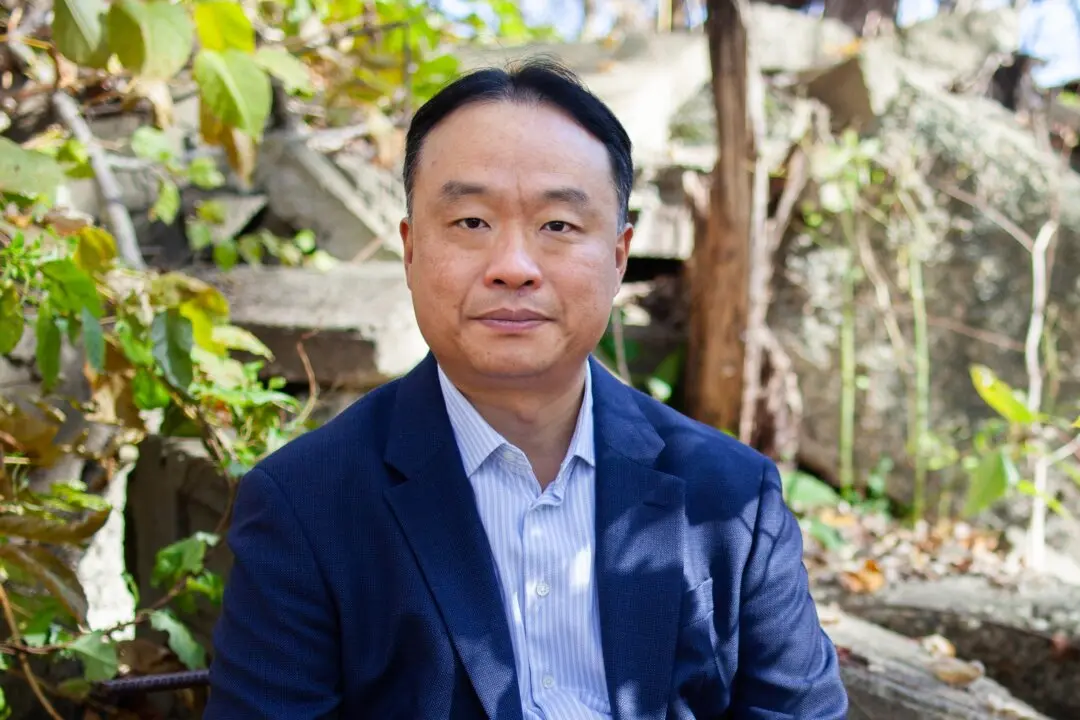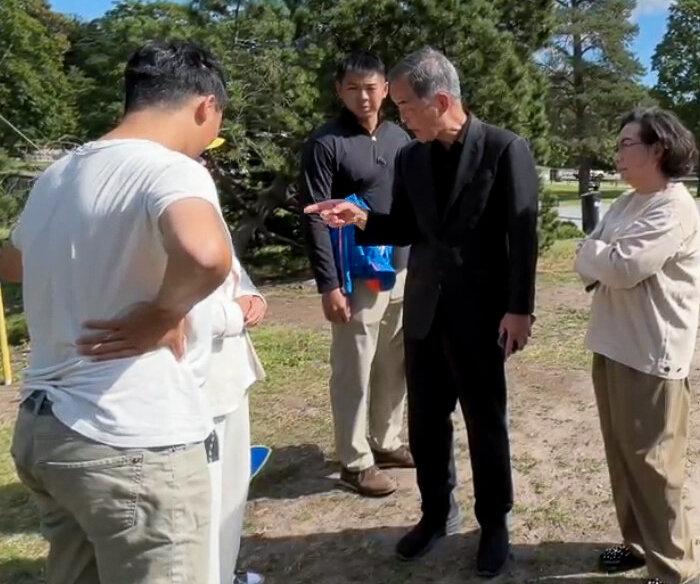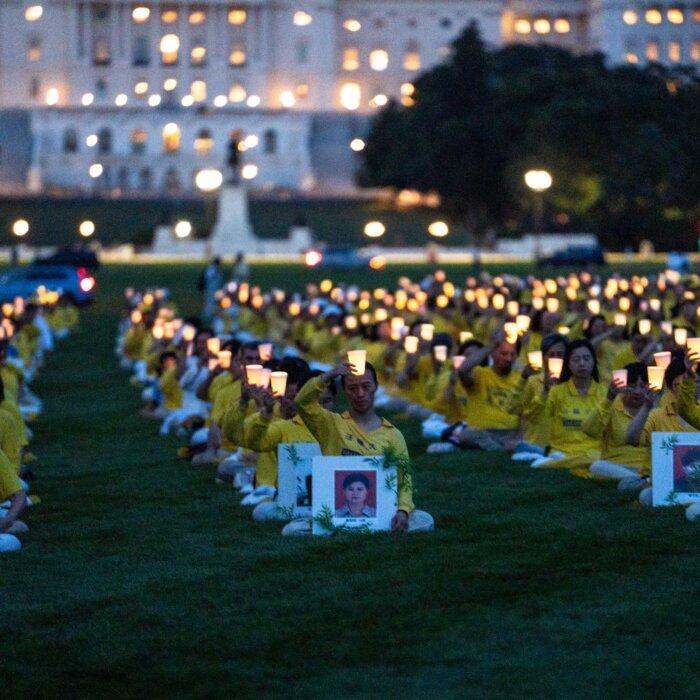David Xie stared at the ceiling. The white light was on day and night, and he couldn’t look away. But that was the least of his problems.
He was lying on a bed, his hands spread above his head and handcuffed to its metal frame and his feet tied down with pieces of cloth. He was detained indefinitely. There was no sentence to serve, no future to hang his hopes on.
They call it the “death bed,” Xie said. He endured beatings and other despicable forms of torture, but this was even worse—simply being tied to a bed, nonstop, unable to move. It didn’t take long for his body to start hurting, he said. And it never stopped, even when a prisoner begged for death. That wouldn’t be allowed. They would be hooked on an IV drip, kept alive day after day, week after week, month after month.
“It leaves you with absolutely no hope,” Xie told The Epoch Times. “That’s terrifying. This psychological torture is perhaps even more brutal and cruel than physical torture.”
He didn’t even know where he was. Only that the guards wore Beijing Armed Police uniforms. But he knew why he was there.
“When you transform, that’s when we‘ll let you off this bed,” the leading officer, Hu Zihui, told him. “Otherwise, you’ll stay there for the rest of your life.”
“Transformation” is jargon of the Chinese Communist Party (CCP) security apparatus that refers to making somebody renounce his or her beliefs—in this case, Xie’s adherence to Falun Gong, a spiritual practice consisting of slow-moving exercises and the tenets of truthfulness, compassion, and forbearance.
The practice became increasingly popular across China in the 1990s and was initially praised by state-run media for its health benefits. But when government surveys indicated that more than 70 million people had become practitioners, the CCP’s attitude flipped. On July 20, 1999, Party media announced that Falun Gong was banned and began issuing a ceaseless barrage of propaganda against the practice.
Xie picked up Falun Gong in 1998 after a relative and a college professor recommended it. He said he was instantly enthralled by its moral teachings.
“I had never come across any other book, or read any academic theory, or any course in school that could teach people to truly be kind, to be good people, or to truly cultivate themselves according to truthfulness, compassion, forbearance,” he said.

A heart condition that left him feeling like he was dying about once a month almost completely disappeared after he dedicated himself to the practice, together with the depression it was causing him, he said.
In July 1999, he was visiting his grandparents in Anqing City, about 300 miles west of Shanghai, where he lived with his parents and attended college. When the Falun Gong ban was announced, he couldn’t comprehend it.
“We were allowed to practice the day before, but not the day after,” he said.
At 21, he wasn’t interested in politics and harbored no strong feelings about the CCP one way or another, he said. In retrospect, he had no idea what kind of regime he was living under, he said.
“It was simply unimaginable,” he said. “How could the government suppress it? It’s absolutely unimaginable. The only thing I could imagine was that they made a mistake.”
He decided to lodge an appeal with the provincial government.
“Since they made a mistake, we should make it clear to the government that Falun Gong is good and that they were mistaken,” he said, explaining his reasoning.
He wasn’t the only one with that idea. There was already a group of people quietly waiting outside the government building, he said.
“As soon as we got there, the police started arresting people,” he said.
They were taken to a remote village in the mountains. There, police took down their information, blasted anti-Falun Gong propaganda from loudspeakers, and then bused them to a bigger city, where they were released.

Journey to Beijing
Xie said it took him a few months to sort out his thoughts. In October 1999, he decided to appeal to the central government in Beijing—in theory, a legal way for the Chinese to voice grievances against the regime.He was ill-prepared, to say the least. He got off the train with no idea where to go or what to do. He didn’t know a single person in Beijing. All he managed to do was find a place to spend the night in a university building under construction.
“I spread out a sheet of newspaper there and went to sleep,” he said.
Accustomed to Shanghai’s mild climate, he was awakened in the middle of the night by Beijing’s cold October weather.
“I got up and walked around to warm myself up,” he said.
Unbeknownst to him, Xie was already under surveillance. The central government had a policy of punishing officials whose local residents appealed for Falun Gong in Beijing. Several people from his university, he later learned, were waiting near Tiananmen Square to pick him up if he showed up.
“I heard they were sitting there all day with stools,” he said.
The next day, he faced a dilemma. If he returned home, he could be arrested or prevented from ever going to Beijing again. But if he stayed longer, he would quickly run out of money.
“I felt I hadn’t yet completed what I set out to do,” he said.
He decided to stay and find a job. At night, he snuck into university classrooms to sleep.
Soon, he found a job as a door-to-door electronics salesman. He was promised a 100-yuan commission for each gadget sale, equivalent to about $14. But in more than a month, he hadn’t made a single sale. With his last 5 yuan, he bought some plain wheat buns, rationing one a day to stretch his supply. His boss offered him a dorm to stay in, sharing a room with six other workers.
Everybody in the dorm knew he practiced Falun Gong, but apparently no one reported him to the police, he said. His demeanor was more powerful than the constant propaganda in the media, it seemed to him. He worked hard and helped others. They particularly appreciated that he volunteered to cook.
Gradually, he started to earn enough to support himself and became a low-level manager.
One day, he went to a wholesale market to buy goods for the business. When he mentioned he practiced Falun Gong, one of the merchants told him there was another practitioner working at the market. It took a while to find him, but it meant the world to Xie. For the first time, he got in touch with the Falun Gong community in Beijing.
In 2001, the company he worked for went under. He thought maybe the persecution was already letting up, so he decided to call home.
Understandably, his mother was worried. He had left her a letter explaining his decision to go to Beijing, but she hadn’t heard from him since. She asked him to return to Shanghai right away. He did, only to find out that his school had expelled him for going to Beijing—even though he never made it to the government appeals office.
Instead of easing up, the persecution escalated. Xie was troubled. He knew the situation in Beijing was bad, and he wanted to help. When he had an opportunity to meet some of his fellow practitioners from the capital, he asked them what he could assist with. He was told they needed someone to circumvent internet censorship and download Falun Gong materials exposing the persecution. A lot of the practitioners were older people with limited computer skills, but it was no problem for Xie.
Soon, Xie helped with the distribution himself. It was frightening work. The whole city had an ominous atmosphere, he remembered.
“You'd see a lot of police officers in uniform patrolling the streets, at subway stations, patrolling everywhere,” he said.
He felt enormous pressure every time he had Falun Gong materials on his person. Getting caught in possession of such literature meant being sent to prison or a forced labor camp.
One cold winter day in December 2001, the fears materialized. As he was walking down the North 3rd Ring Middle Road, two men blocked his way. He tried to step back, but two more were already behind him.
“I was completely unprepared,” he said.
Detention and Torture
Xie was taken to an unknown location for interrogation. Several police officers questioned him about his contact with other Falun Gong practitioners, but he didn’t tell them anything. Then came the beating.One officer strangled him with a baton to prevent him from screaming. Another one started to strike his back and legs with a baton.
“He was ruthless,” Xie said.
The batons were made of rubber-coated iron. Each hit was extremely painful, but the massive bruises don’t show up right away, thus concealing the abuse. Before he lost consciousness from oxygen deprivation, the officers stopped to let him breathe for a few seconds. Then they strangled him again and continued the beating.
These officers knew exactly what they were doing, it occurred to him, and they were quite “skillful” at it, he said.
It was at that moment that he realized the CCP was “extremely evil,” he said.
“I suddenly realized that the Communist Party is nothing like the image it portrays [of itself] in books,” he said.
The officers “had no humanity,” he said. They would threaten him that they would kill him if he didn’t “cooperate.”
“We’re going to hang you from a tree for the whole night, and then dig a hole and bury you alive,” they told him.
“How could a normal police officer say such a thing? It’s impossible,” Xie said.
There was another threat: “We'll send you to northeast China.”
He didn’t know what it meant at the time. He said that years later, he learned that it was the northeast where the CCP began the practice of slaughtering Falun Gong detainees and selling their organs.
After the beating, he was bagged again and sent to a secret detention center. He had no idea where he was, but knowing would have been no help. The plain building bore the lofty inscription of “Beijing Legal Training Center.” In fact, it served as a brainwashing and torture facility.
He was put in solitary confinement with a camera constantly in his face. No contact with the outside world was allowed.
Xie refused to yield to the circumstances. He immediately went on a hunger strike. But the guards simply took it as an excuse for another form of torture—force-feeding. Several people would hold him down in a chair while another shoved a long rubber tube up his nose and into his stomach.
“It causes extreme pain,” he said.
He was force-fed many times. One time, the tube went into his lungs instead of his stomach. A police officer doubling as “medical” staff noticed and pulled it out—if he hadn’t, it would have killed Xie. Minghui has documented many such cases.
Another torture method was freezing. In the winter, guards would run into his cell in the middle of the night, open the window, and pour several bottles of cold water over his head, leaving him soaked through in the freezing temperature.
They would also spread rumors that other Falun Gong practitioners renounced the practice and started to work with the guards.
“They just want to make you feel that if everyone else did that, then you should do the same,” Xie said.
Even then, however, he refused to give up.
And so they gave him the “death bed.”
He was tied to it for more than seven months, until he was so weak his pulse dangerously slowed down and his blood pressure dropped to 40/70. After realizing he was close to death, they finally took him off the bed.
“They didn’t want to take responsibility [for my death],” he said.
His muscles were severely atrophied.
“I seemed to no longer know how to stand,” he said. “I didn’t know how to move my hands.”
No More Fear
At that point, Xie felt like he had let go of his fear of pain and death. There was no longer anything the guards could threaten him with—and they seemed to know it, too. He even did the Falun Gong exercises in his cell, to which he attributed his gradual recovery. Nobody would stop him.Once he recovered, however, the torture resumed. This time, it was the “tiger bench.” He was forced to sit on a very tiny stool for about 18 hours a day. This simple torture method produces excruciating pain.
Even that didn’t break him. He was released in January 2004 at the end of the usual one-year labor camp term.
He went back to Shanghai and after several years escaped to the United States.

“Since coming to the United States, I’ve truly felt what freedom means,” he said. “Here, I can freely practice Falun Dafa, meditate peacefully in public park without fear, and even march alongside thousands of fellow practitioners through the bustling streets of Manhattan. Such a scene would be unimaginable in mainland China.”
Much of the persecution is based on fear, he said. The regime relies on people’s development of the mentality of protecting themselves and avoiding activities that may upset the regime. But it’s actually the opposite, he said. It was only when he truly let go of his fear that the persecutors relented.
“They didn’t dare to persecute me anymore,” he said.
Xie expressed deep gratitude toward the United States for giving him a chance at a dignified life.
“On this free land, I have finally experienced the respect and realization of the fundamental human rights and freedom of belief that every person is born with,” he said.
“I hope that one day soon, everyone living in mainland China will also be able to experience this same sense of freedom, dignity, and happiness.”







